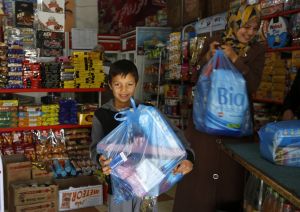Switzerland supports WFP in helping vulnerable Gazan families cope with increased hardships
The Government of Switzerland, through the Swiss Agency for Development and Cooperation, has provided the United Nations World Food Programme (WFP) with a generous contribution of CHF1.5 million (approximately US$1.5 million) to provide much-needed food assistance to Palestinians facing hardship.

Switzerland’s renewed support to WFP helps thousands of poor Gazans cope with increased hardships.
WFP will use the funds to meet the food needs and support the livelihoods of 65,000 people for one and a half months. The majority of those receiving support are women and children who struggle to make ends meet in the wake of an acute humanitarian crisis in Gaza.
Thanks to the Swiss contribution, WFP will provide each person with an electronic food voucher valued at US$10.30 per month. With the voucher, families will be able to purchase the healthy food items of their choice, including dairy products, cereals and pulses available in any of the 85 participating shops.
WFP has been expanding the use of vouchers since 2011 based on evidence demonstrating its stronger impact on people’s food security status and positive effects on the local economy. Vouchers provide people with greater freedom of choice and flexibility to receive food assistance in a convenient and dignified manner.
“We are grateful for Switzerland’s unwavering commitment to provide food assistance to the most vulnerable Palestinians,” said WFP Representative and Country Director in Palestine Daniela Owen. “Their flexible support is testament to the trust placed in WFP’s ability to make a difference in improving people’s lives, and an exemplary practice of partnership and Good Humanitarian Donorship in line with Grand Bargain commitments to better serve people in need.”
In the face of funding limitations, WFP’s capacity to provide continuous assistance to all severely food-insecure people living in deep poverty is challenged. In Gaza specifically, food assistance is a fundamental safety net for those whose socio-economic conditions continue to worsen.
The Gaza strip continues to be hit by an acute energy crisis which impacts all economic activities and affects the delivery of essential basic services, including life-saving medical care and safe water treatment. The crisis is exacerbating an already fragile humanitarian situation caused by eleven years of economic blockade, strict restrictions on trade and people’s movements, the reduction in the salaries of tens of thousands civil servants and a slow post-conflict reconstruction process.
This is taking the heaviest toll on the poorest who increasingly rely on credit and support from family and friends, or skip meals to cope with a rapidly deteriorating situation.
In Gaza today, one in two people is poor (53 percent) and unemployed (48 percent- the highest rate in the world) and at least 40 percent food-insecure. Gaza continues its trajectory of de-development. The United Nations has warned that the small enclave is on track to become inhabitable by 2020.
In 2018, WFP seeks to assist 314,000 of the most food-insecure Palestinians, prioritising those in Gaza where humanitarian needs are most acute. WFP requires approximately US$20 million to fully implement its food assistance activities through 2018. WFP relied on multilateral
funding to avoid an interruption of assistance and meet the food needs of 85,000 people in February and March.
Source:World Food Programme
- 217 reads
Human Rights
Ringing FOWPAL’s Peace Bell for the World:Nobel Peace Prize Laureates’ Visions and Actions

Protecting the World’s Cultural Diversity for a Sustainable Future

The Peace Bell Resonates at the 27th Eurasian Economic Summit

Declaration of World Day of the Power of Hope Endorsed by People in 158 Nations

Puppet Show I International Friendship Day 2020

